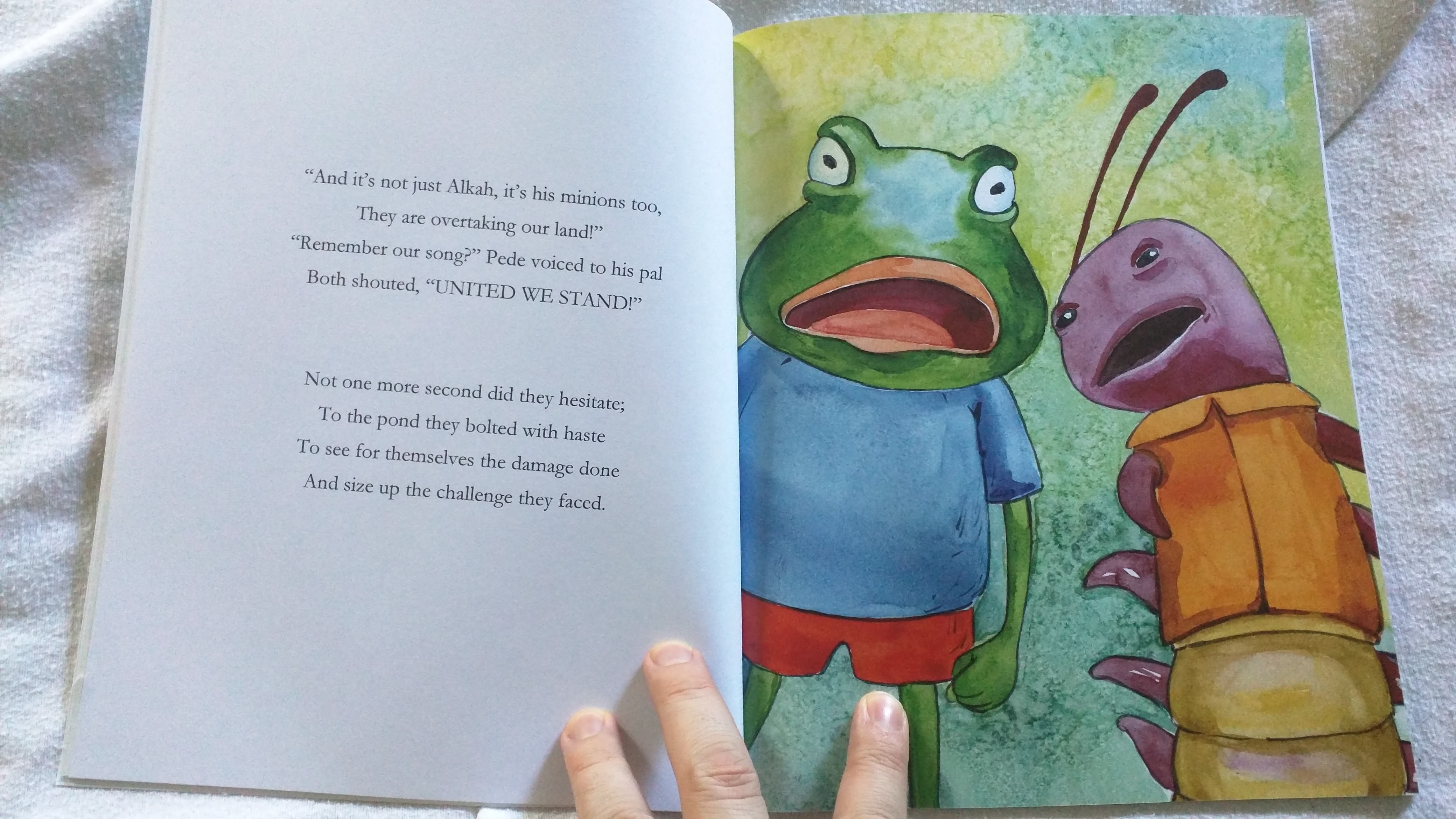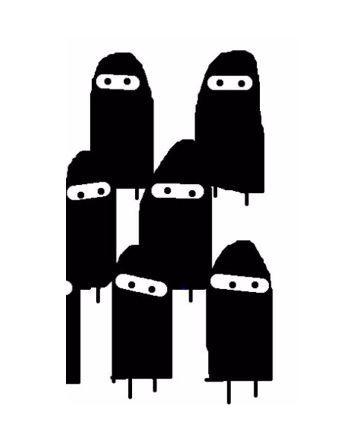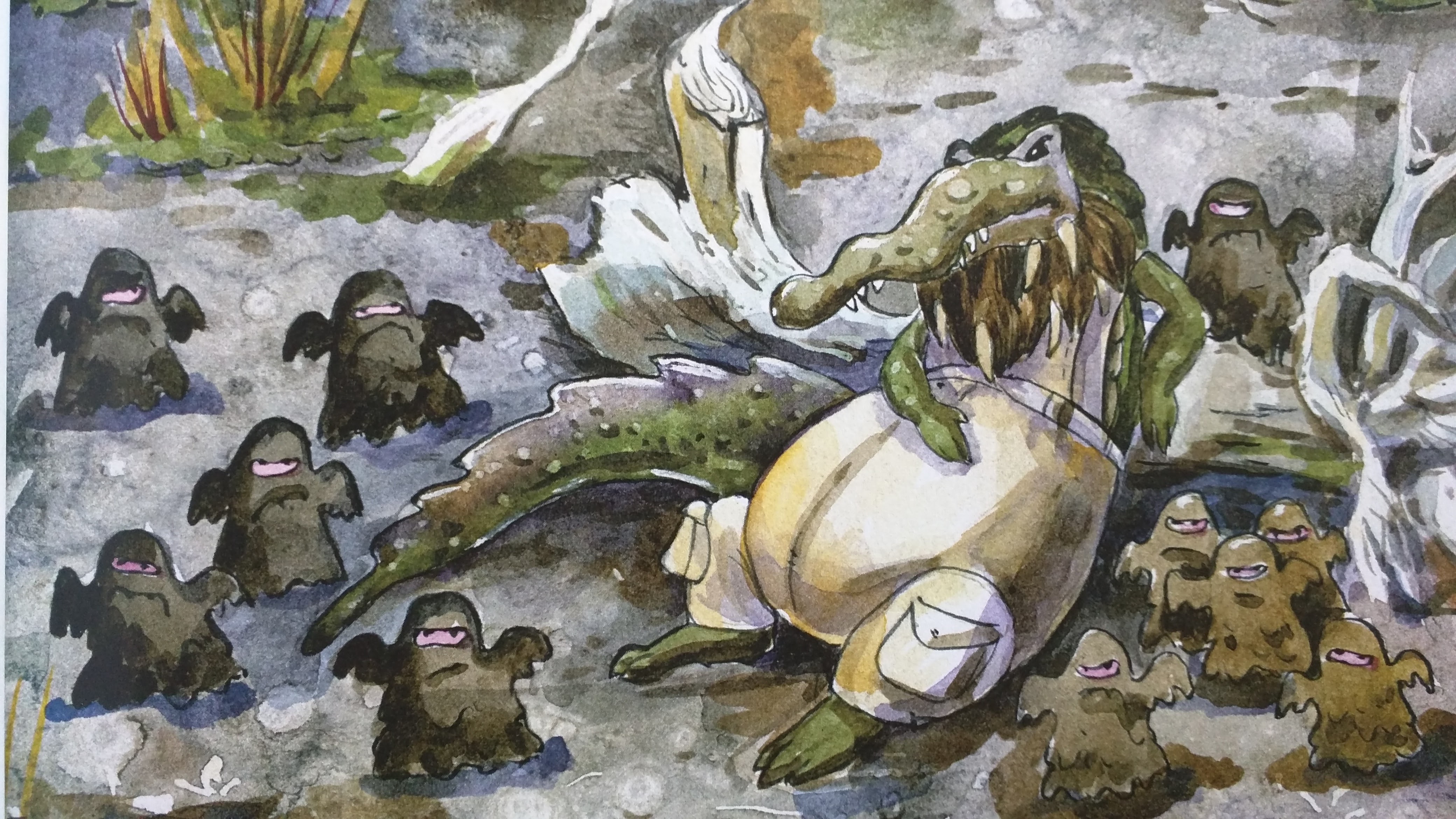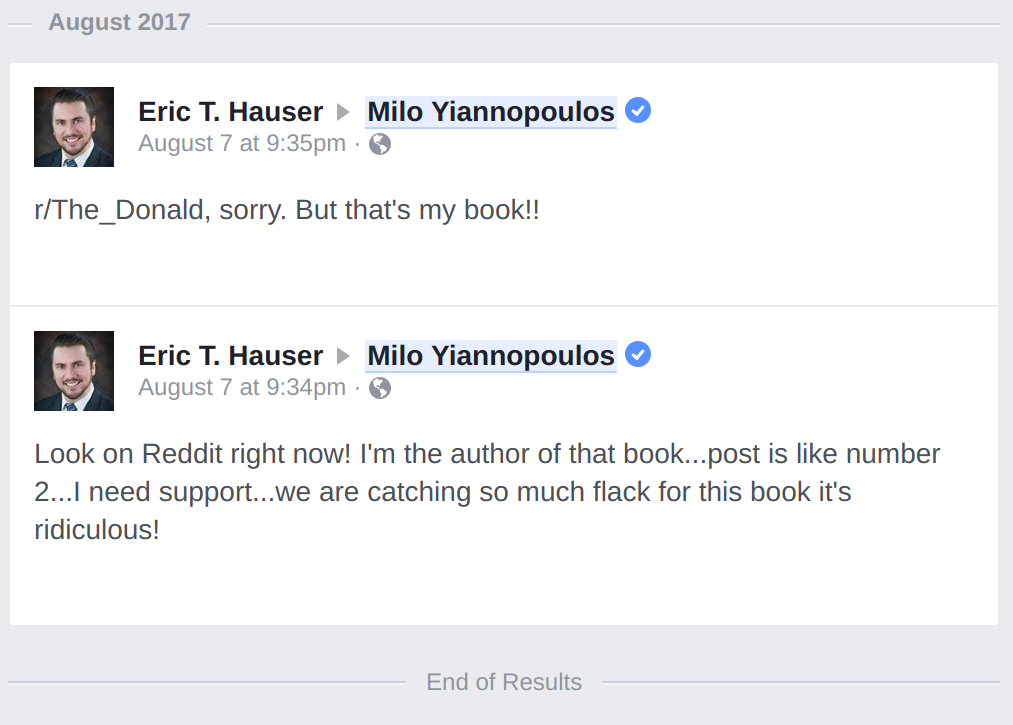A Texas Assistant Principal Wrote an Alt-Right Children’s Book
Credit to Author: Matthew Gault| Date: Tue, 15 Aug 2017 19:36:12 +0000
At first, The Adventures of Pepe and Pede seems innocuous. The children’s book, released on Amazon on August 1, tells the story of Pepe the frog and Pede the centipede. They’re excited because Wishington Farm, where they live, has a new farmer in charge. After eight years of bad leadership, the friends are happy to finally enjoy everything the farm has to offer.
Their revelry is cut short when they find out their favorite pond is now a murky swamp ruled by the terrible alligator Alkah. The buddies use teamwork and honesty to take down Alkah and free his minions from their muddy chains. “With law and order now restored, this land was great again,” the book explains as the two triumphant friends bask in the glow of their victory.
The book, initially self-published by Texas author Eric Hauser, has been criticized for spreading a racist, Islamophobic message. Amid the controversy that erupted in the past two weeks, it has been picked up for a hardcover release by Post Hill Press, an independent publisher that has previously put out conservative-themed books such as Thump: The First Bundred Days and Go the F**K to Jail: An Adult Coloring Book of the Clinton Scandals. Simon & Schuster distributes Post Hill Press’ printed books, but Post Hill Press makes its editorial and publishing decisions independently.

A reader’s interpretation of The Adventures of Pepe and Pede will depend on their working knowledge of alt-right memes. Pepe the frog is a cartoon character created by artist Matt Furie that became an internet meme. During the 2016 US election cycle, the alt-right adopted him as a symbol and mixed him with fascist imagery, and today both the Southern Poverty Law Center and Anti-Defamation League recognize Pepe as a hate symbol.
Online fans of Donald Trump refer to themselves as centipedes. Alkah is a bearded alligator, his name is one letter off from Allah—the Arabic word for God—and in this story, his minions are all beautiful pink creatures covered in icky black mud. In the book’s illustrations, they look like women in burqas.
Hauser denies that his book has racist themes. “The alligator was based on a recurring nightmare my daughter kept having. She would often describe this alligator as having a beard and wearing a robe like a wizard,” he told Motherboard in an email. Motherboard contacted Nina Khalova, the book’s artist, who is based in Ukraine. She provided us with documents showing that some of the character designs are based on religious stereotypes.
Khalova provided Motherboard with a Word document where Hauser outlines his vision for the book and what kind of art he’ll need. It describes the alligator character, Alkah, who wears white coveralls and sports a full bushy beard, and his minions, pink starfish-looking creatures covered in black mud.
“As for the alligator,” Hauser wrote in the document to Khalova. “Can he wear a white robe? And I want his beard to be more full…as for the minions, I would like to mud to be almost black mud, and I would like the eye holes to resemble these guys:” The image he sent the artist for reference is below.

The image is a cropped version of this webcomic depicting women in burqas from the website TriangleCircleSquare, a collection of crude political cartoon-style illustrations.
“It was very important for the little mud monsters to have eyes resembling the picture I sent to my illustrator,” Hauser told Motherboard. “Not because of the resemblance to the burka, but because of the eyes. I wanted pink to be showing through, and without those specific eye holes, it wouldn’t have looked right. The pink represents the human in all of us.” According to Hauser, the alligator was ultimately portrayed in overalls, not a robe, because it was more suitable for a farm scene.

Hauser was, until recently, assistant principal at Rodriguez Middle School in Denton, Texas. A few days after he released Pepe and Pede, principal Renee Koontz told the rest of the school staff that Hauser had just published his first book. The title immediately rattled at least one teacher, who told me about the meeting.
“That can’t be what I thought I heard,” teacher Chad Withers told Motherboard in a phone interview, recalling the moment he learned about the book. Withers is the middle school’s theater teacher and an 11-year veteran of Denton Independent School District (ISD), which includes Rodriguez Middle School. He worried the book might be coded alt-right propaganda aimed at children, but he reserved judgment until he’d read the thing.
Once he had, he was horrified. “The book was worse than I thought,” Withers said. “The story itself is despicable, racist, and xenophobic. I was disgusted by it. I’ve never seen anything before that was so obviously targeted propaganda to children.”
Withers isn’t alone. There’s been a backlash against the book in Denton, where Hauser lives. A Denton-area parent with a child in the school system told Motherboard she was “real upset about it.” She spoke with me on condition of anonymity because she fears a backlash from Hauser and the district. She doesn’t want to make school hard for her daughter.
“It’s an anti-acceptance message about forcing the people who aren’t like you to change”
“I think that it’s a propaganda tool,” she told me in a phone interview. “It’s using lingo that the president uses that is, in my opinion, racist. Like draining the swamp. It uses Kek, which is related to a white-nationalist organization…he is being protected by the Denton Independent School District. For a lot of people that’s very alarming. For me, it’s scary.”
“The minions of Alkah…it looks like all of their bodies are covered except for their eyes,” said Withers, the teacher. “When they are ‘freed’ all of the dark material over their bodies disintegrates, revealing their pink tone underneath. I mean, how can you look at that and not see what is the meaning there?”
“Even if the character’s name is Marcus the frog and there were no references at all to 4chan rhetoric, I believe it would still be an inappropriate book,” he added. “It’s an anti-acceptance message about forcing the people who aren’t like you to change.”
Denton ISD did not return Motherboard’s request for comment. However, Hauser’s bosses have defended him elsewhere in the media. “We are aware of Mr. Hauser’s publication,” Denton ISD spokesman Mario Zavala told the Dallas-area NBC affiliate. “The book was written on his own time, using his own resources and is not affiliated with our curriculum or instruction. Mr. Hauser’s book and its contents belong to him and are not tied to our district.”
On August 12, the Denton ISD announced Hauser had left Rodriguez Middle School to take a new, yet-to-be-determined position, but he will not serve as a campus administrator or educator. “Our community understands our primary focus is the education of our students,” Superintendent Jamie Wilson wrote in the statement. “Anytime something occurs that becomes a distraction to the learning process, we will address it.”
Read More: Trolling Scholars Debunk the Idea That the Alt-Right’s Shitposters Have Magic Powers
“Due to the controversy surrounding the book I have published, I think it’s best that I not serve as assistant principal at Rodriguez,” Hauser said in the announcement. “The students, the community, and the teachers are too important to me to subject them to all the negativity and disapproval resulting from this book. To my colleagues, I offer my deepest apologies if this has affected them or their families in any negative way.”
Despite—or perhaps because of—the negative publicity, Post Hill Press signed Hauser to a book deal days after its initial publication. Publicist Devon Brown told Motherboard via email that an editor at the company “saw a flurry of activity on the subreddit The_Donald,” and the company decided to pick up the book and sign him. Simon & Schuster declined to comment on the content and themes of The Adventures of Pepe and Pede.
*
Readers familiar with alt-right memes will immediately recognize the message of The Adventures of Pepe and Pede. Hauser dedicates the book “to my fellow centipedes. May we never tire of winning.” As Pepe and Pede walk to their pond on Wishington Farm, they ascend Kek Cliff—another alt-right reference—and Patriot’s Plateau. At one point, Hauser calls Pepe and Pede “nimble companions,” an apparent reference to r/The_Donald’s “nimble navigators.”
The Honesty Tree, the pair’s favorite part of the farm, hasn’t sprouted a blossom in the eight years the previous, evil farmer was in charge. Hauser writes repeated references to making the farm great again and restoring law and order. The book’s Amazon listing makes its political message explicit.
“Pepe the Frog and his best friend Centipede unite as one to restore law and order, and bring freedom back to Wishington Farm,” it reads. “Join these two brave friends as they use truth and honesty to battle the deceitful forces threatening their home. In this allegorical children’s tale, kids will find an exciting battle of good vs. evil and adults will find clever parallels to the conflict between truth and ignorance that faces America’s leaders.”
Hauser has defended the work by saying he meant it to represent conservative values, but he has denied he is a member of the alt-right movement.
“If you love America then you’re going to love this book for sure,” Hauser told The Dallas Morning News in a taped interview. “Some of the central themes are honesty, humor and friendship.”
“There is nothing wrong with those characters,” Hauser told The Dallas Observer. “They’re not bad characters. I disagree with the [alt-right or white supremacist] label. I think that label was put on Pepe in an attempt to silence conservatives.”
Despite Hauser’s attempts to distance himself from the alt-right movement in interviews, Withers and the mother we spoke with disagree. In addition to using an offensive political cartoon as a reference for his characters, Hauser reached out to former Breitbart writer and Trump supporter Milo Yiannopoulos—who had a book deal with Simon & Schuster, which was later cancelled—on Facebook on August 7. Hauser has since deleted those posts.

Kalova, the book’s illustrator, is a freelance artist of children’s books living in Ukraine. She’s got a few other projects under her belt but nothing overtly political. I reached out to her via email and she told me that the controversy around the book had taken her by surprise.
“I’m Ukrainian and I don’t know about symbols, persons and political waves in America,” she wrote to me in an email. “Really, I don’t like Donald Trump as the president, but it’s a choice of American people.”
Kalova told me that she never received the full text of the work. Hauser told her he hadn’t finished writing it when he contacted her about illustrations. Instead, Hauser sent over descriptions of what he wanted Kalova to draw and a rough outline of the book. “We didn’t talk about the actual theme of the book and I just did a job,” the artist said.
When I explained that people in Hauser’s community were upset about the book’s use of politically charged imagery, she said it “shocked” her. “I mean any association of my illustrations with fascism…because I hate that theme and all about it.”
Withers is shocked too. He finds Hauser’s explanations through the media, and the apparent continued backing from his bosses, concerning. “It’s so obvious that this man is lying through his teeth [when he] said that this character is based on his daughter’s nightmares,” he said. “You really want us to believe that? He has lied to the community in which he teaches and lied to America about his intentions and what he was doing with this book.”
It seems all this attention has made his book a hit. “We checked the book’s sales ranking and immediately searched out the author and began a dialogue to bring the book to a wider audience,” Brown, the publicist, told me. “Previously, the book was available for sale only online. We intend on bringing the book into physical bookstores as well as expanding its online availability to multiple retailers.”
I asked Brown about controversy around the title. “We do know that some are trying to make Pepe and Pede controversial, but we do not consider it to be,” she said. “Through a child’s eyes this is nothing more than a feel-good book about good triumphing over evil. We love that the book is written as allegory. If a parent chooses to use the story as a tool to enter in go a larger discussion about our nation’s political climate, they can. It’s unfortunate that an educator who has written a book that uplifts the virtues of truth and honestly has received such scrutiny.”
Get six of our favorite Motherboard stories every day by signing up for our newsletter.